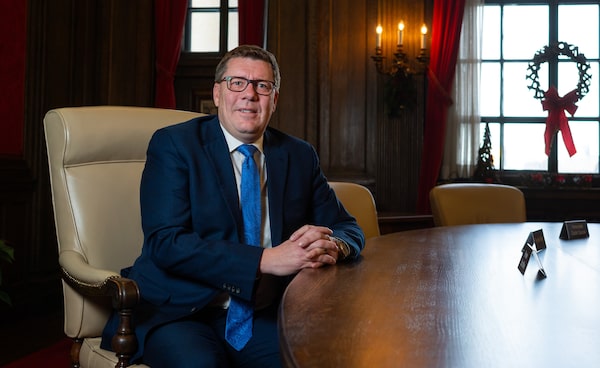
Saskatchewan Premier Scott Moe sits for a photograph in the cabinet room at the Saskatchewan Legislative Building in Regina, on Dec. 18, 2023.Heywood Yu/The Canadian Press
The Saskatchewan government is promising big-ticket spending on health, education and communities along with no tax hikes and a $273-million deficit.
Finance Minister Donna Harpauer introduced the 2024-25 budget Wednesday, saying that with a growing population and a strong export-focused resource sector, now is the time to invest.
“I would have loved to have ended my last budget as balanced and able to do a tax reduction,” Harpauer told reporters before introducing the document in the house.
“However, it is the budget I am comfortable with, because I do think the premier decided to prioritize in substantive increases.”
This is Harpauer’s last year in politics before she retires and the last budget from Premier Scott Moe’s Saskatchewan Party government before a fall election.
The budget promises more than $1-billion in additional spending in core areas, including to address classroom sizes and supports for learning, to shorten surgical wait lists and to boost its revenue-sharing program with municipalities.
Total spending for the budget is pegged at just over $20-billion, and the debt is expected to rise to $34-billion by spring 2025.
Along with the deficit in the 2024-25 budget, there is also more red ink in the current budget.
The projected deficit for the fiscal year ending in March is expected to almost double to $483-million.
Harpauer defended the deficit budgeting.
She said Saskatchewan has the second lowest net-debt-to-GDP ratio in the country, and the province needs to keep pace with a growing economy and rising population.
The Opposition NDP said the budget is another exercise in bungled money management and missed opportunities from a government that can’t be trusted to keep its word.
NDP Leader Carla Beck said the Saskatchewan Party made promises before the 2016 election, then made cuts.
She said the budget offers no fuel tax relief for commuters and doesn’t bring forward innovation to transform the health-care system.
“This province used to be a nation leader in health care,” Beck said. “If there was ever a time to pop the hood on our health system and repair it from the ground up, this budget would have been it.”
Budget day came with an added twist of labour disruption.
Teachers across Saskatchewan walked off the job for the day to draw attention to an impasse in contract bargaining with the province.
Teachers held rallies, with some outside the legislature shouting, “Support education!”
The teachers want issues including classroom sizes and additional supports to be part of the next collective agreement, but Moe’s government has refused.
Instead, the government has promised millions of dollars in additional spending to tackle those issues outside the collective agreement.
The budget hikes education spending by $248-million to $3.3-billion. There is also $46-million more for classroom supports.
The Saskatchewan Teachers’ Federation said the increases don’t meet the needs of enrolment growth.
“They are about $250-million short to fill the gap in education and it is simply not enough,” said federation president Samantha Becotte.
Jaimie Smith-Windsor, president of the Saskatchewan School Boards Association, said the funding offers a path to stability.
“We’re treating this as the floor, not the ceiling, and we’ve had assurances that is the case,” she said.
On the health-care front, funding is to rise by $584-million to $7.6-billion, including more money for the Saskatchewan Health Authority.
The money is aimed at increasing capacity in the acute-care system and reducing surgical wait-lists. There is also more money to hire paramedics and do more medical imaging tests. And there is $3.5-million more for breast cancer care and screening procedures.
Bashir Jalloh, president of the Canadian Union of Public Employees local 5430 health union in Regina, said he appreciates the promise to spend more but the province must follow through.
“In the past, they have talked about an increase in health care and an increase to focus on recruitment, but we have yet to see that,” said Jalloh.
The province is boosting the money in its revenue-sharing deal with municipalities by $42-million for a total of $340-million.
Randy Goulden, head of the Saskatchewan Urban Municipalities Association, said she’s pleased but worries about reductions to the northern transportation system, which includes highways, ice roads and airports.
On the capital spending side, there is $4.4-billion mainly for the main areas of schools, health care and communities.
The government is not introducing any new taxes or boosting existing levies.
The Saskatchewan United Party, which has one member in the legislature, said in a news release the province lacks fiscal responsibility with its spending and deficits.